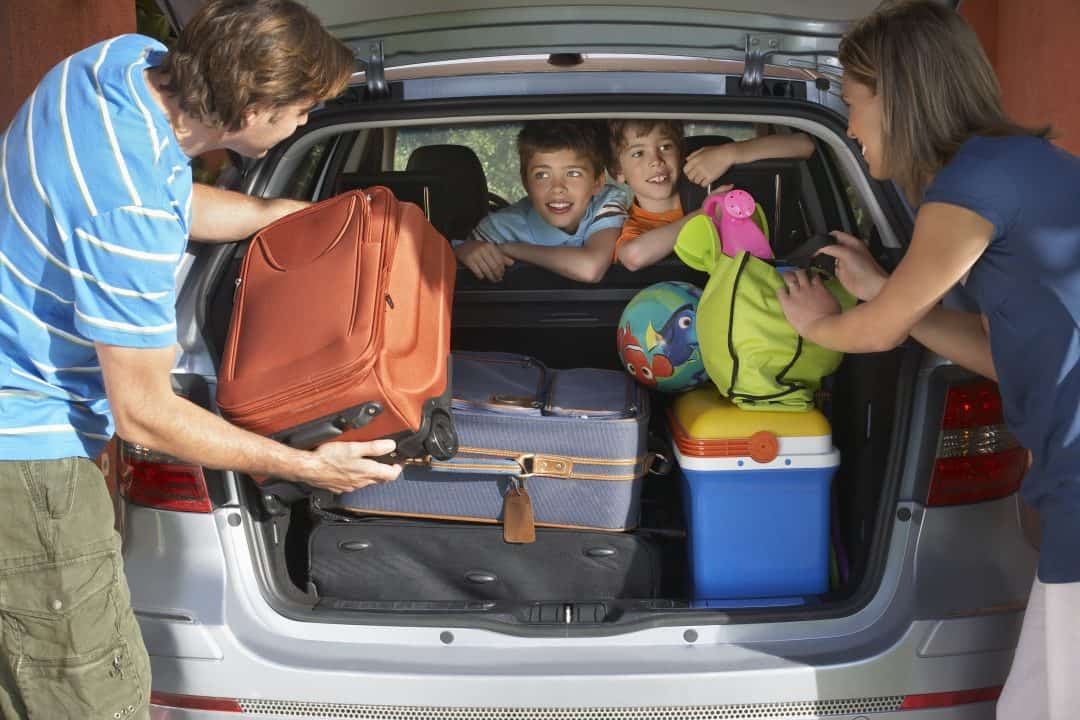There’s nothing worse than traveling for what feels like light-years, only to find out that you’ve forgotten something extremely important to your trip. Especially in a remote habitat where you don’t have the luxury of being able to purchase your forgotten item from the shops.
Sometimes the fear of forgetting essential items, leads to over-thinking and over-packing. Packing too many useless items can be just as bad as forgetting items.
In this post I’ll try to outline all the essential items you’ll need for your trip. Emphasis on the word “Essential” as you’ll probably want to take extra items depending on your situation and requirements. The items I’ll be listing are item which you’ll need to have a delightful trip.
Heating / Warmth / Cooling
Cabins lack the insulation that homes can provide, due to their often-basic wooden structure. This means that when it’s cold outside, it will be cold inside your cabin and when it’s hot outside, it will be baking inside your cabin. The lack of plumbing means that gas heating systems are not an option.
Every cabin needs some sort of heating system. Some cabins will have A/C’s and furnaces to take care of this problem however not everyone’s lucky enough to get a cabin connected to the grid. Most people don’t want to be on-grid, there want to be isolated from the rest of the world.
One option would be to purchase a generator; however, you’d need to invest a lot of money into a large generator to power a furnace, otherwise you’d have to make use of a small A/C.
A fire is the most authentic method for heating when staying in a cabin. There’s no better way to do it. A properly lit fireplace can provide enough heat to warm up your whole cabin, and comes at virtually no cost. There’s no need to purchase an expensive furnace which will set you back thousands when you could get a beautiful fire going. The only down-side to this is that the fire must be fueled with fire every so often.
Firewood and Cutting Tools
If you’re using a fireplace as your primary heat source, then you’ll find that you’ll need a constant supply of firewood to keep your fire going. This is quite simple if you’ve got a shop close-by which you can purchase firewood from. However, if you don’t then you’ll have to cut your own wood.
You should bring a splitting maul or an axe so that you can split logs into smaller pieces. Other tools such as a saw may also come in handy in case you need to top-up your fire with some branches and twigs from nearby trees.
Cooking / Food
No matter where you are in the world, you always need to eat – however food is a bit harder to manage when you’re staying in a cabin compared to a home in the city. The sufficient equipment should be purchased such as a fridge, or an ice chest. One important thing you can pack is a cooking pot/griddle. This will be needed so you can cook food over a fire.
Apart from a cooking pot, there’s also several other kitchenware that you’ll need. You’ll need pots and pans for boiling water and cooking food. A frying pan will also be needed for frying food. You probably won’t need all the extravagant tools and equipment that you have at home such as a blender and sandwich maker however you will need basic cooking utensils. Basic cooking utensils such as spoons, forks, knifes, spatulas, stirring spoons and whisks will be required for basic cooking.
If you don’t fancy eating off the floor with your hands, you’ll also be needing equipment to eat with such as bowls, plates, cup, eating utensils and glasses. Forgetting these could lead to an awful cabin experience. I’d highly recommend purchasing disposable equipment such as throw-away paper plates, cups, and plastic utensils. This removes the chore of cleaning up, who really wants to be doing dishes whilst staying in a cabin? Using throw-away tools just makes your cabin experience feel more authentic.
How to keep food cool and fresh at an Off-Grid Home?
Not everyone is lucky enough to have a refrigerator in their cabin to keep their food and drink cool and fresh. If you do then you can transport your cold food in a cooler and then dump it in your fridge, however if not then you’ll need to purchase a chest freezer. You’ll need to pack enough ice to keep the chest cool or stop by nearby shops to replace melted ice. These chests work well because they’re insulated extremely well. Whilst the coolers lid is open, not a lot of cold air is let out since the cold air is heavier than the warm air.
Off Grid Transportation
Transportation is very important, especially when you’re staying in an off-grid home in a remote area. There usually a lot of open land begging to be explored, however the terrains are often uneven and rough which makes it extremely difficult to travel around. Hiking can be the cheapest way to get around and can be rather enjoyable however it can be exhausting and take up a lot of time and energy, therefore some sort of vehicle is usually a lot more effective.
Bicycles can be off grid transportation easy, they require no fuel nor special skills to ride. The only draw-back of them is the amount of energy they take up and you may require a tire pump if the tires become uninflated.
Transportation can be very entertaining if you’re cabining during the winter. If weather is sufficient enough, you could use a snowmobile for transportation. These are a bundle of fun and may be the only way to get around if the snow around your cabin is deep enough.
If it’s not quite the right weather for snowmobiles, then another form of transportation which you may enjoy is an ATV. These can be used in the correct weather and terrain. For information on ATV’s then I’d recommend ATV.com.
If you’re going for a completely natural experience than you could consider using a horse for transportation. This could be a lot of fun however you’d have to maintain the health of your horse and feed it every day.
Another form of transportation which you should consider if terrain is too uneven for an ATV is a dirt bike. Though, for this option you’d have to already have the skills and experience to ride one properly. If you plan on using a dirt bike to travel and want to find the perfect dirt bike for yourself, then I’d recommend checking out the DirtRider website.
Seating and Standard Furniture
Seating and other forms of furniture are a hundred percent necessary when staying in a cabin. Without sufficient seating, you’re not going to enjoy your stay at your off-grid home. It’s very important that you have somewhere to relax and eat your meals, who really wants to eat their meal sitting on the floor or standing up straight.
If you do end up forgetting your seating, you’ll have to make the most out of tree stumps and makeshift wooden seats. These won’t be anywhere near as comfortable as a good and proper chair, but you’ll have to make do with what you have.
Other than seating furniture, you’ll also need to pack basic furniture to survive with such as lamps, beds, and sofas. Without these your quality of life whilst staying in your cabin will be very poor.
You can’t forget to bring tables and counters, without them you’ll find yourself eating your meals from your lap or off the floor. Apart from food, you’ll be needing tables to place a variety of other household objects.
Storage Solutions
Since cabins are often a lot more compact than a normal home, you must make the most out of the little space you have. You’ll probably have many things which need to be stored and just leaving them placed on the floor in rooms takes up a lot of space and makes the cabin seem untidy.
Because of this you should ensure you use your storage efficiently. Storage containers should be used to hold smaller items compactly together, these can then be shoved into the corners of rooms or small cubbies.
First Aid
First aid is essential no matter where you’re travelling to, you can never forget how important your health is. First aid is just as important whilst you’re staying in a cabin as it is when you’re staying at home. In-fact, first aid is a lot more important whilst you’re staying in a cabin as there are so many more hazards present than there is in the city.
Some things which may be dangerous and lead to the need of first aid:
- Bugs
- Animals
- Intruders
- Rough Terrains
- Poor Weather
There’s a whole list of things you’ll need in your first air kit. You should do your own research to ensure that you pack all the essentials however I’ll list a few.
- Plasters
- Scissors
- Insect spray
- Bandages
- Medicine
- Safety Pins
Remember that their a load more important items you need to bring, for a full list you should check the NHS website, they’re professionals in this field and will ensure that you have a safe trip.
You should also check my Cabin First Aid Kit Guide.
Communication Devices
No matter where you are in the world, you’ll want to ensure that you have some sort of communication device. You never know when you’ll need to get a message across to someone, whether it be for leisure or emergency purposes.
Cell phones are probably the most convenient communication device, I’m sure that you know how to function one and probably use one everyday whilst you’re staying at home however not everyone is fortunate enough to have cell reception at their cabin. Another draw-back of cell phones is that you’ll need to keep them charged especially if the reception is not great as mobiles use more battery searching for signal.
Another communication device you could use is a two-way radio. These radios don’t require any cell reception so they’re very useful anywhere in the world. These are useful however they are limited by their radius. The radius of these devices is not the greatest, and only effective if you’re in line of sight of the other communicator.
A better alternative is a ham radio. These have everything which a two-way radio have however they have a hell of a lot longer range than a two-way radio. With the use of repeaters, you can establish a range of over a hundred miles. This enables so many different opportunities such as communicating with someone from another cabin and communicating in an emergency for help. Ham radios have antennas which can be removed if needed. Ham radios have a lot of extra features such as the ability to pick up radio station frequencies, they can also utilize more than one frequency.
I’d recommend that you purchase this ham radio, it is very cheap and affordable. I’ve tried a wide range of ham radios however this is by far my favorite, it works even better than a lot of other more expensive ones.
Hand Crank Weather Radio
Another communication device which you may want to consider bringing up to your cabin is a weather radio. Many people don’t even know this exists, however I’d highly recommend bringing one on your journey. Keeping track of the weather is very important as it allows you to plan your activities according to correct weather. An alternative to this is to use your phone however if you cannot get reception then a hand crank weather radio may be your only choice.
The reason I’ve recommended a ‘Hand Crank’ radio is because it doesn’t have many requirements. You do not need cell reception, internet, batteries, or any form of power for it to work. You’ll create your own power by cranking it up.
I’d recommend you purchase this Hand Crank Weather Radio, it’s very cheap and affordable. I’ve tried quite a few of these weather radios however I’ve found this one has the most features and takes on a modern look. This one comes with a flashlight and reading lamp to provide you light in desperate needs. The main feature this radio has is solar power; it charges up whilst in sun-light, so you don’t have to do the traditional cranking.
Sleeping Accommodations, you should make when staying off-grid
Sleeping arrangements is something you cannot forget. Cabins lack the isolation that homes can provide, due to their often-basic wooden structure. This means that when it’s cold outside, your cabin will be freezing, therefore it’s very important to remember your blankets and sheets. You should prep more blankets than you usually would, due to the extreme weather you may face when staying in a cabin. You’ll want to ensure If you’re not sleeping in a bed, then you must remember to pack you sleeping back.
Bathroom Items you should bring when staying off-grid
Bathroom essentials may slip your mind when your preparing for your journey however you ‘ll greatly need these items to have an enjoyable stay. Firstly, you need to make sure you bring toilet paper unless you fancy wiping your butt with leaves. If you’ve got plumbing and a proper toilet in your cabin then you’ll want to keep a plunger, to unclog the toilet if you must. You’ll also want to have cleaning products to clean out your toilet occasionally.
You cannot forget essential toiletries such as your toothbrush and toothpaste to brush your teeth and keep your hygiene up. You’ll also need soap to wash your hands and scrub yourself down. These are things which I’d say are essential, however there’s a load more things you could pack to live a bit more lavishly. For example, you could bring air spray, scented candles, foot scrubber, etc.
Flashlights and Spare Batteries
A lot of the time, you’ll find yourself needing a flashlight to get around in the dark, whether it be inside or outside your cabin. Flashlights are great as they can provide a portable light source, and depending on your flashlight, they can provide long lasting battery life. Regardless, you should ensure that you keep spare batteries.
When I stay off-grid, I enjoy doing a lot of late night exploring so I keep plenty of flashlights and batteries handy. I store these flashlights all around my cabin so that no matter where I am, there’s one accessible to me. You never know when you’ll need one so it’s a good idea to scatter them all over the place.
Generator
When staying in a cabin or anywhere off-grid, a generator can be the most useful piece of equipment you could ever have. Due to the lack of electricity you may struggle with everyday tasks. If you can afford to invest in a generator, your trip with be 150% more enjoyable.
I’d highly recommend this generator. Why? You should check out my post in which I reviewed this amazing generator.
My name is Eugene Thornhill. I'm an outdoor enthusiast who loves nothing more than being one with nature. I've lived in numerous outdoor homes and even constructed my own. Living off-grid is something I'm very familiar with, more so than living in the city. For many years I've dealt with the many problems of living off-grid. It's time to pass on my knowledge through Cabinguides.


